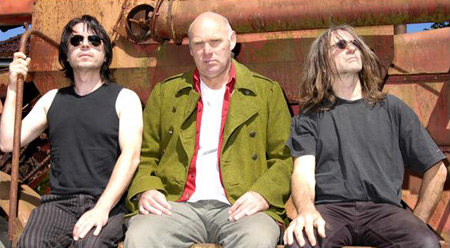
In his hard-to-find but continuously enjoyable Krautrocksampler, Julian Cope declares, “There is no group more mythical than Faust.” So, standing within inches of the band as it performed at the opening night of the WFMU Fest seemed like it would be a clarifying experience. Here was this legendary and elusive name, now physically embodied and definable, right there on the stage — but wait, what’s that? It’s a trumpet calling from the balcony.
Just when I thought I had identified the whole of Faust in front of me, another element beckoned from behind. Founding member Jean-Hervé Péron kicked off the set by blowing on a horn from the rear of the room and gradually making his way to the stage like a wayward member of a marching band. And throughout the night, the group continued to splinter the notion that it can be boiled down to any finite designation. A vacuum cleaner; a cement mixer; a mid-set painting interlude; a grinding wheel and piece of sheet metal colliding to shoot sparks across the stage; these were all parts of the Faust fluxus.
Sure, the band touched on much of their lauded early work, including multiple tunes from Faust IV (“Sad Skinhead,” “Jennifer,” “Krautrock") and tracks from its debut (“Miss Fortune”) and sophomore (“So Far”) albums. But those songs took on new shapes and curves with the help of recent additions James Johnston (a former Bad Seed) and Geraldine Swayne. Such classics morphed even further when plopped between spoken-word segments, playful improvisations and enthusiastic exclamations from Péron. After the group had given a post-encore bow at center stage, Péron capped the night by pretending to run headfirst into the belly of hulking drummer Zappi Diermaier. Why? Why not?
Two kinds of seriousness preceded Faust’s gleeful display. French psych-metal trio Aluk Todolo opened the night with heavy, brooding songs that stared straight into the abyss. Not even a broken string averted their gaze; guitarist Shantidas Riedacker maintained the group’s constant spaced-out squall while restringing his axe. Cold Cave followed, appearing as icy and dark as their name implies. The group’s detached Kraftwerk-esque manner came across as almost ostentatious, and their noisy synth-pop felt more fitting for a dimly lit bedroom with headphones than a bustling Brooklyn venue.
Faust quickly turned the night’s frown upside down, though, leaving Aluk Todolo to be the band most likely to have bargained with the devil and Cold Cave to be the most Teutonic. Instead of acting in line with the literary allusions of its name or conforming to the German stereotype, Faust was whatever its members’ whims dictated it to be, and that was by far the evening’s most gratifying experience.